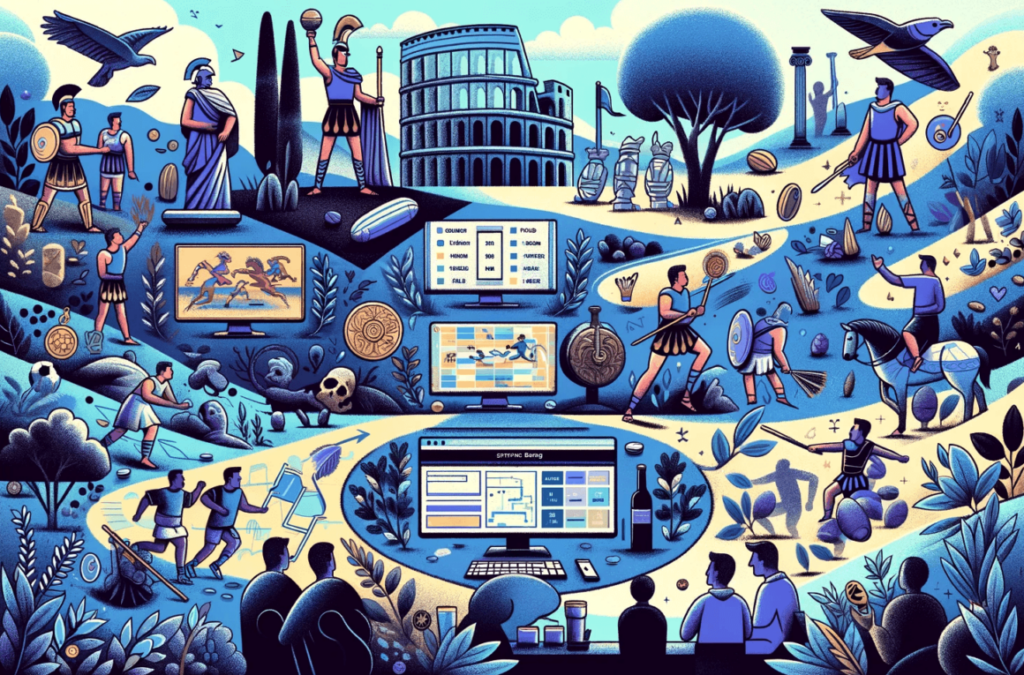This risky entertainment has been a part of human history. People used to engage in different forms of betting activities for centuries: the possibility to wager on an event with unpredictable outcomes and win has always been attractive. From the most primitive dice games popular in ancient civilizations to top-notch digital platforms in 2025, betting kept its initial appeal. The evolution of gambling activities doesn’t only allow us to track major technological advancements but also witness how this pastime affected cultural and economic development. It’s time to explore the sector deeper, so let’s begin with its roots!
Betting in Ancient Civilizations: How It Began
Of course, no one would tell you the exact date when the first bet was placed – but you will be surprised that it happened many thousand years ago. The first mentions of this entertainment were found in 2300 BC in China. Although this risky entertainment is prohibited in Chinese jurisdiction in the 21st century, the country can be rightfully considered the cradle of gambling activities. Ancient Rome and Ancient Greece were also the destinations where the pastime was widespread. You might have heard of the renowned gladiator fights that were initiated for wealthy people to enjoy athletes’ performances. Placing bets on these events’ results was pretty common during that era, while Greeks preferred to bet on Olympic Games participants.
Betting Evolution in the Medieval Era
While civilizations advanced, betting continued to play a critical role in the cultural evolution of all regions. The Medieval period can be characterized by more formal gambling practices. The first casino, Il Ridotto, was established in Venice in 1638. This establishment was designed for Italian royalty and elite to enjoy betting and games of chance in a regulated environment. Here, the history of brick-and-mortar gaming houses began: this renowned gambling spot works till now, and every betting enthusiast is honored to visit it.

During that time, the first gambling competitions were launched. Players used to play card games and win valuable prizes, but this entertainment was accessible to a limited number of people. This era was marked by a significant transition of chaotic betting activities to the first regulations. However, the poor were still not allowed to visit majestic casinos, and underground gambling clubs were increasingly popular.
Rise in Betting Activities of the 19th Century
At the beginning of the 1800s, more gaming clubs opened their doors to visitors. For instance, Casino de Monte Carlo, a luxurious casino, has quickly become a desired gambling destination and remains so until now. This century is famous for a rapid rise in horse racing: although this sport has existed long before, people showed increased interest in such events. Many racetracks, including the Royal Ascot, were opened, and risk-seekers got the chance to bet on the participant and watch a spectacular tournament. Undeniably, excitement in this activity resulted in the appearance of betting syndicates where visitors could place their predictions on the race outcome.
20th Century: The Beginning of the Modern Gambling Era
The 20th century began with the discussions about betting club’s legality. People already understood that this entertainment can be harmful to mental health, and governments globally aimed to prevent illegal activities and control the sector. Till the 1930s, all forms of gambling activities were strictly prohibited in numerous countries, and attempts to break the law were severely punished. However, people continued organizing underground casinos and betting shops.

The US became the first to change legislation and develop appropriate controlling bodies in 1931 when Nevada suffered from economic crises. The launch of the first casinos helped the state cope with challenges and become the world’s gambling capital. Other countries, including the UK, amended betting regulations in the second half of the 20th century. The sector became more controlled and imposed significant restrictions for punters and operators.
Digital Betting Era and Industry-Changing Advancements
The first online bookmakers were introduced in the late 1990s, and the beginning of the new century brought significant innovations to the sector. Many renowned companies providing high-quality services for betting enthusiasts and operating till now started operating during that time, like OneX Bet, whose history began in 2007. The first sites were primitive and provided users with simple sports wagering opportunities and were only available in some regions. However, the digital revolution helped the industry develop really quickly – and look where we are now.
Mobile betting has become a life-changing technology, allowing punters to make predictions on preferred disciplines anywhere in the world. Moreover, users and operators got instant access to loads of data, improving their interaction and website functionality. Residents of Ancient Rome or Medieval Italy would have hardly believed that this simple entertainment would reach such a significant level. Other important things that changed the wagering sector include:
- Implementation of blockchain
- Rise of AI usage in betting
- Live betting opportunities
Of course, operators, content providers, and developers are not planning to stop and constantly work on further betting advancements. AI technologies are already changing the iGaming landscape by offering higher data protection and personalized experiences, and it’s projected that it will provide users with even better experiences in the future. VR and AR also hold massive potential for the betting industry, and we only have to wait a while to enjoy their real-life implementation.

